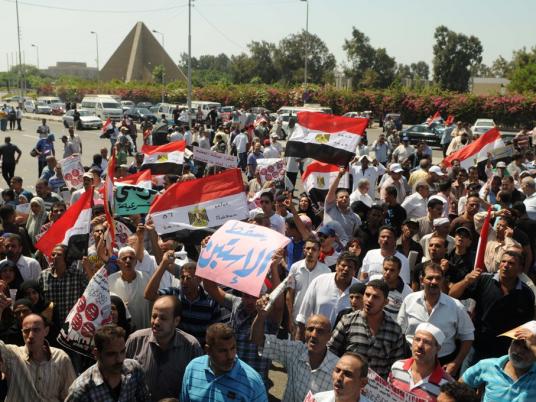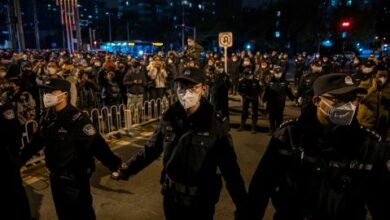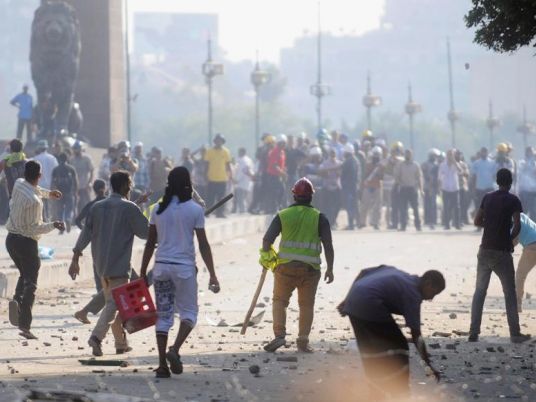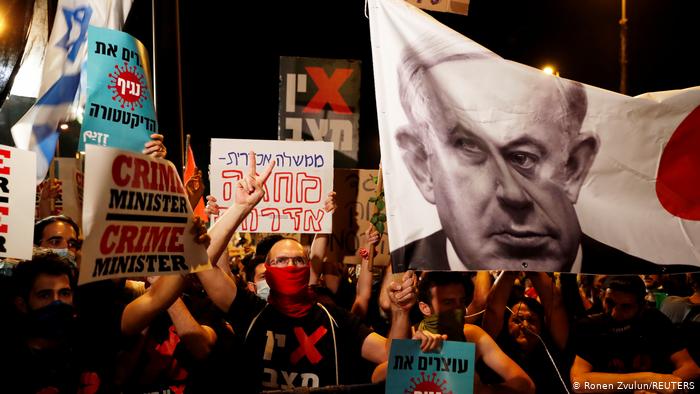
A few thousand anti-Muslim Brotherhood protesters marked what they called the "24 August revolution" with a sit in outside the presidential palace, where President Mohamed Morsy lives. Protesters were disappointed by the low turnout.
A few hundred gathered in Abbasseya Square near the Ministry of Defense, while others protested in front of Al-Manassa in Nasr City, before they join each other in front of the presidential palace. The call for the demonstration was heavily backed by former MP Mohamed Abou Hamed, who arrived late in the day to speak to the crowd.
The palace was cordoned by soldiers, which was described by Abou Hamed as a sign of Morsy's "fear of the revolution."
Abou Hamed distributed "the revolution's first statement" which listed nine demands of the protest, including the dissolution of the Muslim Brotherhood, or its legal registration as an NGO that has no relationship with politics.
The statement also called for the dissolution of the Constituent Assembly, an investigation into an alleged plot between the Brotherhood and Hamas regarding the opening of prisons on 28 January last year, and the investigation of alleged meetings between Brotherhood leaders and intelligence chiefs of foreign countries.
The protests saw strong participation from women, who were actively leading the chants, organizing the protests, and calling for ordinary citizens to join them.
Nesrine Mohamed, 31, was calling loudly and enthusiastically on car drivers to join the protest in Abbasseya Square, urging them to "cleanse Egypt from terrorism,” referring to what she described as a plot by the Muslim Brotherhood group and Hamas to destroy Egypt.
Mohamed, who voted for former air force commander Ahmed Shafiq in both rounds of the Presidential election, told Egypt Independent that she will fight until Egypt is a civil state and "liberated from the oppression of the Brotherhood".
"The Brotherhood wants to control the country entirely. They have suppressed all voices of dissent," she said, referring to the closure of the Al-Fara'een Channel and the charges against its main anchor Tawfiq Okasha, over allegations of insulting the President and calling for him to be killed.
The Chief Editor of Al-Doustor Newspaper Islam Afify was also referred to the Criminal Court on similar charges and was detained hours before Morsy used his legislative powers to abolish imprisonment for pending investigations against journalists.
Some protesters spoke of plots by the Brotherhood and other regional figures to divide Egypt, spread terrorism and cause chaos.
In particular, many referred to an alleged conspiracy between the Brotherhood and Hamas in organizing the Rafah border attack that left 16 Egyptian soldiers dead.
"Morsy appointed former head of the military intelligence Abdel Fattah al-Sisi as Defense Minister, while he should be held accountable for the Rafah shooting," protester Abdel Kerem al-Gamal said, referring to rumors that al-Sisi belongs to the Brotherhood.
Amazigh (Berber) activist Amani El-Weshahy, who held a banner reading "Long Live Egypt" in her native language, said that the main objective of her participation in Friday's protest is the dissolution of the current Constituent Assembly for not including a seat for Amazigh Egyptians.
"This assembly excludes all Egyptian minorities like women, Copts, Nubians, Bedouins, and Amazigh. We should call for a constitution for all," said the activist, who filed a lawsuit in front of the Administrative Court to dissolve the assembly.
Protesters slammed the unexpectedly low turnout, criticizing Egyptians for their quiescence in the face of Brotherhood domination. They believe that the Brotherhood used the media to spread rumors of widespread violence against public property to scare the masses and discourage participation.
Many of the protesters were heard speaking on their mobile phones to others at home and asking them about the media coverage of the protests.
One of the protesters, who preferred to stay anonymous, was telling anyone who would listen that they should head to "Mubarak's Palace." When questioned by Egypt Independent, the protester insisted that the palace is still Mubarak's, and was "stolen" by the revolutionaries and the Brotherhood.
The composition of the protesting crowds did not reflect a diversity of political forces, bringing into question whether they represent a genuine opposition to the Brotherhood. Many revolutionary forces declined to join the protests.
A bearded reporter, allegedly part of the Brotherhood's Egypt 25 Channel team, was caught by protesters while filming empty spaces within the sit-in near the presidential palace. The reporter was badly beaten before dozens rescued him from the angry mobs.
Reporters from ONTV and Al-Jazeera Egypt Live crews said they were also attacked by protesters.




